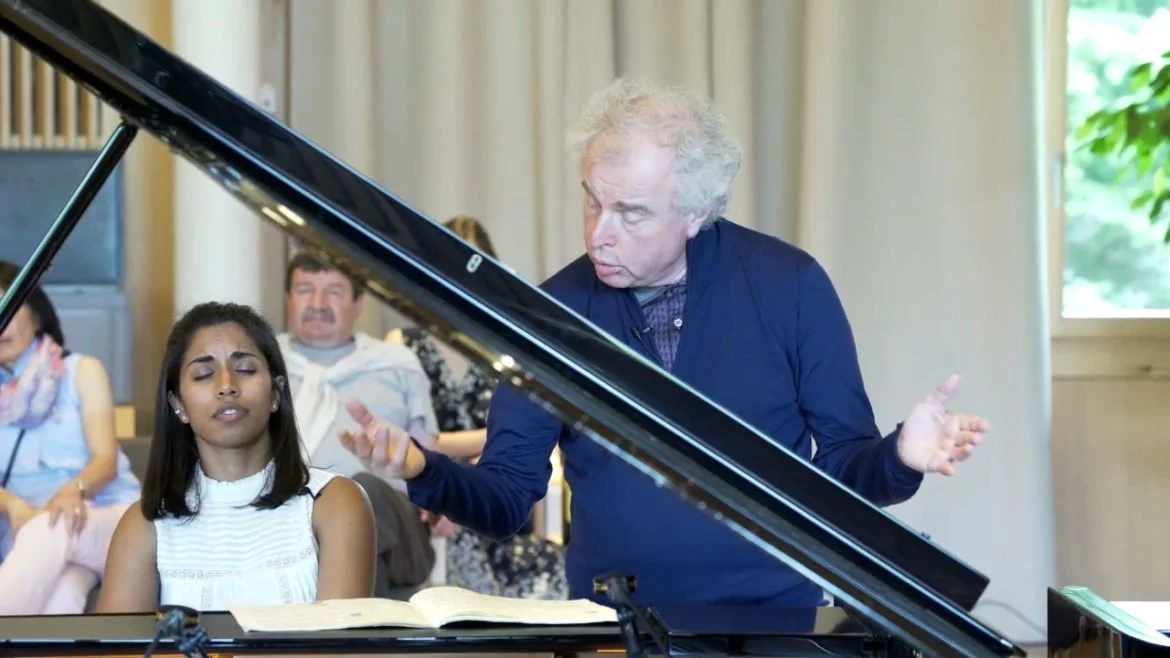Variationen und Fuge über ein Thema von Händel Op. 24; Variation 15, 2nd half
Gstaad Piano Academy 2019 with Sir András Schiff
Recorded live on July 22, 2019
Pallavi Mahidhara plays Variationen und Fuge über ein Thema von Händel Op. 24; Variation 15, 2nd half by Johannes Brahms
Indian-American pianist Pallavi Mahidhara made her orchestral debut at the age of 10, performing at the Ravinia Festival in Chicago. She is the Second Prize winner and Young Audience Award winner of the 2014 Geneva International Piano Competition. In the 2018-2019 season, she made her debut at the Konzerthaus in Berlin with Metamorphosen Berlin under Wolfgang Emanuel Schmidt, in Budapest at the MÜPA with the Danubia Orchestra Óbuda under Róbert Farkas, and with the Eugene Symphony in Oregon under fellow Curtis classmate, Teddy Abrams. The rest of the season includes collaborations with Diemut Poppen, Pavel Gomziakov, István Várdai, and Theo Fouchennert. Pallavi Mahidhara is honored to be joining the 2019-2020 concert season of “Building Bridges” with Sir András Schiff. Pallavi received her bachelor’s degree from the Curtis Institute of Music, and her master’s degree at the Hochschule für Musik Hanns Eisler. She studied for several years with Dimitri Bashkirov at the Escuela Superior de Música Reina Sofía, and is a Piano Professor for the school’s Music & Culture Summer Camp in Madrid, Spain.
Learn more about Pallavi Mahidhara and her future projects here!
A Masterclass Like No Other
There are as many different types of masterclasses as there are musicians: The masterclasses taught at the Gstaad Piano Academy by Sir András Schiff are particularly revealing and informative. They are a special treat for both the young pianists as well as the ever-growing audience visiting the town hall in Saanen. (Sir András Schiff’s masterclasses are open to the public.
The Hungarian pianist puts emphasis on studying what he feels are the essential composers: Bach, Mozart, Beethoven and Schubert. With short, yet precise and always generous comments Schiff instructs his students to be true to the great composer’s score whilst sharing their own originality and personality with the audience. «If a pianist only hears two colours, whatever his fingers «produce» can’t be of much value. However, the highly subjective performances of Alfred Cortot created millions of colours and shades, not unlike the masterpieces of great painters.»
How to get to the bottom of a masterpiece?
Sir András Schiff’s masterclasses are outstanding. In contrast to the many teachers who like to interrupt their students regularly to correct their playing, Schiff allows their music to evolve. Sometimes he takes his time and listens to an entire phrase. And we, the audience consider ourselves lucky, because we get to enjoy an whole concert, analysed by the master himself. Sir András Schiff believes that only in this manner one can strive to be true to the score – and express the composer’s truth, not the interpreter’s vision. He also shared with us the fact that whilst studying in Budapest he learned more from composers, notably György Kurtág and Pál Kadosa, than he ever learned from other pianists.



